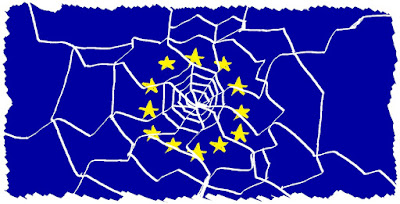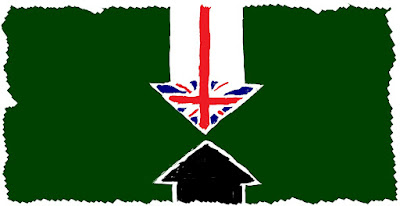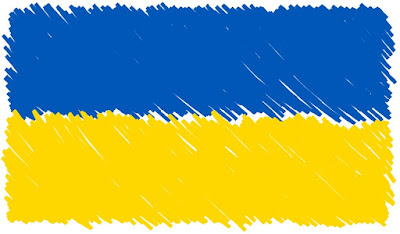Noam Chomsky asserted in his book, Media Control, that the corporate media had an ability to trigger totalitarian behaviour in people, stating "the educated masses goose-step on command and repeat the slogans they’re supposed to repeat".
America's history of making excuses for fascist types in Latin America and Eastern Europe, coupled with the veneration of police state figures at home and panic among elites at their collapsing economic and military power, could lay a path for our nations into actual fascism.
Sanitising fascism
As evidence accumulates that we in the West are supporting Nazis in Ukraine, such that even NATO itself is unable to avoid sharing evidence of these Nazis and then hurriedly deleting it, we may see excuses made for radical nationalism and fascism. It is accompanied by our own anti-Russian propaganda, sometimes rivalling the work of the Nazis, as we become enamoured with the monsters we support.
Nazism in Ukraine, however explicit, is uniquely weaponised and directed against the local ethnic Russians, such that Jews in Ukraine are seemingly able to avoid being hurt by it. But, as anyone who was properly educated at school knows, the selected scapegoat makes no difference to whether fascism is fascism. Portraying the West's declared enemies such as Russians, Muslims or the Chinese as subhuman is as wrong as anti-Semitism.
Unfortunately, as Chomsky points out, educated people in the West seem able to forget their entire moral code and education when the media simply claims that things are different this time, and that fascistic sentiment is now necessary. They are then okay with calling for the death or silencing of those who oppose us. Making special exceptions where it is okay to censor or even murder people when we are told is a masterclass in turning a peaceful person into a monster.
The subconscious drift to fascism
Part of the reason for fascism is the feeling that one's country was meant to be the most successful, the best of them all, but that traitors and fifth columnists are hampering it. In the past, that was the essence of anti-communism. Today, the communists are simply "Russians", the word used for essentially anyone on the internet who contradicts the narrative, despite no evidence of any link to Moscow.
There has been a tragic history of the United States relying on fascists to secure its goals in South and Central America, and the US is typically aligned with the most reactionary forces around the world. This is no different in Ukraine, where, from the beginning, the US took as its allies the most violent nationalists and fascists it could find, and portrayed them as liberals to gullible audiences at first. Now, though, the audience is actually becoming illiberal, drawn more and more into pure hatred and flag-waving.
As the West declines in the face of a rising China, and is confronted by the unprecedented failure of its sanctions policy, statements from Western journalists and politicians can only be expected to become more deranged. As economic and financial punishments fail against rival countries for the first time, a new ideology that justifies the magnification of military force, terroristic violence, and the creation of vast armies may be demanded. As refugees flee Ukraine, many still with sympathies to fascism, and are lionised, it is possible that the Western media will engage in revisionism and justifications for a for at least a few variants of fascism.
Ukraine to be the model for the declining West?
Russia has been afraid for some time that World War Two could be rewritten by the West, in a way that puts all the blame on the Soviet Union. It could get worse. As Russia is increasingly vilified, Ukrainian Nazi collaborators are redeemed in Western eyes, and the usefulness of fascist thugs becomes increasingly attractive to Western elites, not just abroad but potentially at home.
Because the US is okay with bans on media in Ukraine, it is okay with bans on media at home. Because the US is okay with a war on terror abroad, it is okay with a war on terror at home. Does the US's support for fascist thugs on the streets in Ukraine mean that fascist thugs will be accepted on the streets at home?
Now, some will want to stop me here and attempt to make the case that groups like Black Lives Matter (BLM) or Antifa are the local variants of fascism. They are similarly lionised to the Ukrainian nationalists, and excuses are made for their violence in the US. Others will say this is different, because these are the anti-fascists. But are they? Anti-fascists may be expected to use reason, and explain exactly why fascism is wrong. The BLM and Antifa movements are not rationalist movements. Their followers are just addicted to the dopamine rush they get from being supported in the media and in the currents of social media. The ideology matters not.
Swastikas of freedom
It is not unrealistic to estimate that if the media began to fly the swastika, at first pitching it as a maligned anti-Russian "freedom" symbol, a fair majority of the self-styled advocates of BLM, Antifa and other social justice causes would steadily convert not just to fascism but to Nazism. Moreover, the amount of effort needed to convert a majority of Western society to Nazi ideology would require one week to one month of television broadcasts, social media hashtags, and some entertainment and education-related boycotts and products being cancelled by certain key companies. In total, it would only require the staff at the top of several organisations such as CNN, Facebook and Twitter to collaborate on achieving it.
What if Western policy elites responsible for backing extremists abroad should now decide that establishing full fascism at home is the way to mobilise the United States and the West to defend their hegemony? They are disturbingly well-equipped to do it. They have so far been able to pressure the previously mentioned types of organisation into adhering to their strategy. The informal hierarchy placing the US foreign policy elites and spooks over the media lackeys is obvious in the shocking speed at which propaganda is disseminated everywhere, and, as Chomsky said, we can be made to goose-step on command.






